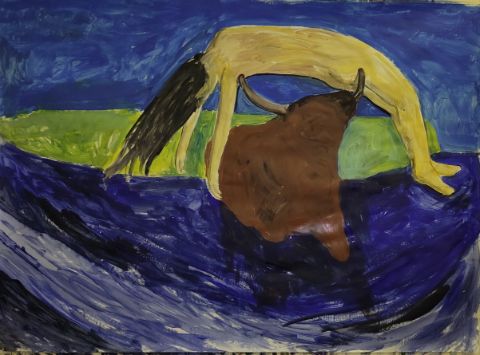I don’t know anything about Utopia.
I don’t know anything about the East.
I don’t know anything about Europa.
1
In my fantasies, Europa appears in the role of a middle-aged woman who, due to her unbelievable naivete, mounted a bull and was carried away. She swam out to sea on its back. With apparent ease she bade farewell to her former life and accepted her fate almost emotionlessly emotion. Only her pose in one painting or another suggests something like a struggle, but in reality it is a pose of recovery.
I, on the other hand, have always detested big changes and cherished what already existed in my surroundings.
In the Ukrainian artist Kateryna Lisovenko’s painting The Rape of Europa, the body of Europa hovers above the horns of the bull. She is almost dead or indeed dead, and only in this way is she being abducted. The sea becomes a gap, a confined space threatening to engulf the woman and the bull. Her facial features are soft and blurry, as if she had already said goodbye to her former life, ready to take none of it with her on her journey. In this painting, her face is turned away, as if she could not even probe into herself, and the only thing that can fill this void with content is the uncertain future.
Why didn’t she dare to jump into the water when she was still so close to the shore she was leaving? I am convinced she was a good swimmer. Otherwise she would have panicked on the back of the bull.
In this founding myth, man, bull, and sea are bound together. A god is also present, the old patriarchal god, the supreme one of all, who determines everything and bestows direction and order on the chaos of this union.
Nevertheless, the location is ambiguous, which is an essential part of this myth. There’s something disquieting about the spatial emptiness of the sea, the uncertainty as to where the bull is swimming. In Titian’s painting of the same title, only the bull’s gaze is directed at the viewer, and it becomes the only source of stability in a composition where all other bodies are set in confusing motion.
Eastern Europa—a suspicion flits through my head—would not allow any of this. It would set a direction, even if the point of departure remained entirely unclear.
At the same time, it is difficult to decide whether one lives in Europe or outside of Europe. Everything becomes blurred and indistinct when I try to image the border of Europe or Eastern Europe.
Europa can be conquered, abducted; then she disappears like a little dot in the open sea. I’d like to stand on the banks and see her off. I’d like to see how she swims away. The white bull would interest me less. I wouldn’t pay it any attention. Even so I ask myself now: would he also want to seduce Eastern Europa? How would Eastern Europa have spent her time before the fatal encounter with this bull? Would she also play on the beach with her companions? I answer myself with conviction: certainly not!
Eastern Europa would be too serious for that. She would already be a little more seasoned, a little more bitter than Europa, and would know that playing on beaches can lead to dangerous encounters. She would be much more daunted by her previous experiences and she might not react to the bull at all.
An alternate version. On that day she would be a little angry and unhappy and chase the bull off the beach. The poor animal—be it the god himself—would simply refuse to put up with somewhat broken, tragicomic, emotionally explosive character.
If an entirely new myth was to be written about ‘Utopia Eastern Europa’ in the twentieth and twenty-first centuries however, this old story might not be mentioned at all. It would not be about passion, but about art.
The myth would probably tell of a special, ‘good’ art that can only emerge on the ground where it has to fight for its own freedoms. Under the pressure of recurring censorship and self-censorship, corruption and collective fears, something very special, important, and strong should emerge. Something that could be greeted as a beautiful exception in a huge struggle with its circumstances. A word of art which is capable of giving hope to the whole world but is inevitably placed on a ruin.
That’s how I imagine this myth. It’s just a little too abstract, and compared to the ancient tale, something human falls away here. Instead, the utopian is more strongly represented. Modern myths tend towards political generalizations anyways. But that much can finally be forgiven.
2
I’m trying to formulate my coming thoughts, I really want to formulate something. But for some time now my thoughts come up against an obstacle.
Perhaps this obstacle is my idea of Europe—the idea of an imaginary unity. A non-geographic space connected by the concept of human and non-human rights.
I find myself in Kyiv however and see how such an idea transforms into pure utopia. Of three concepts—utopia, the East, and Europe—only the East remains on this evening. Because drones are now approaching us from roughly that direction.
At first the red zone of air strikes covered the region around Kyiv, and the city itself was considered safe. But now the air raid siren is clearly audible next to my house; the Shahed drone attacks on Kyiv have begun.
Drones also attacked Kyiv last night. I slept through the air raid siren. In the morning I went out to drink a coffee not far from my house. I walked with my head down, how I often do when I’m working, and didn’t pay much attention to my surroundings. Then I noticed big and small stones lying next to the wall of a 100-year-old building. They hadn’t been visible yesterday. I raised my head, on the lookout for damage. It seemed as if the buildings had only been lightly hit, the wall had almost remained intact—no destroyed floors, no burnt-out apartments.
I didn’t see an apocalyptic picture of what the attack wrought. Maybe it wasn’t drones at all, something else, I thought to myself. Maybe something else happened and a chunk of wall from the upper floors had fallen onto the asphalt. What could have happened? I tried to investigate it in my thoughts. But nothing came to mind.
The air warning is a form of care. Something that connects streets, cities, regions, everyone who has grown accustomed to it in almost two years of war.
Some Kyiv residents complain that the air-raid alarm box, which often hangs from a lamppost, is too close to their windows. In such cases, the alarm significantly disturbs sleep and housework. Recently, a Kyiv resident, my friend’s neighbour, was so upset about the attempt to place the siren near his apartment windows that he threatened to shoot the city services with a blank gun.
He was nervous and desperate, the neighbours supported him, city services complied, so the whole house can continue to sleep during night-time air alarms. Of course they can be heard, but the nearest alarm boxes are far away and everyone has become accustomed to the volume.
When the alarm sounds, it means someone wants everyone to stay alive. This wish, like a sound wave, opposes the randomness of death and its arbitrariness. Assaulting drones and missiles serve a lottery, serve an intention: to cause death wherever they can. Usually it doesn't matter exactly where—but always somewhere near me, in my city, in my country. Something is meant to be injured, something connected by a common fate.
This is how connections are formed, how imaginary communities are formed—that’s what I suspect sometimes in moments like these.
Another air raid alarm. This time rockets are flying towards the city. Air defences can be heard greeting them in a friendly manner, the explosions are muffled, barely audible.
My friend, who used to be afraid of air alarms, has stopped telling me about her agitation. I realize that during these months of war, it is almost unusual to talk about such fears.
For many of the people I have met in Kyiv and Mykolaiv in recent days, the war has artificially transported them back in time. The sirens that sound every day are often spoken about in the past tense: ‘I used to be frightened by the sirens, I spent the night in an air-raid shelter, hid in the bathroom and in the hallway.’
More and more the war is discussed as if it had split into two parts: the first, which caused shock, surprise, and horror. And this other ongoing war—one would prefer to remain silent about it—discussed in all sorts of ways, whether with irony, anger, or tears in one’s eyes. The most important, appropriate words are spared the big events and saved for small, practical things, for details.
3
I phone Mykolaiv again and again to reach the water supply systems. Finally we are in contact, I can come, I am invited. A very pleasant woman’s voice promises that I will see ‘everything’ with my own eyes.
Since spring 2022, the salty water of a new, never-before-used water source has been flowing through Mykolaiv’s water pipes. The source has since been changed again because the water was so salty and cloudy in 2022 that you had to rinse your hands with a different, specially procured drinking water after washing them.
The town is sixty kilometres from the front line and had 500,000 inhabitants before the big invasion.
A year before the war, I visited Mykolaiv and met Oleh Maniljuk, who organized a shelter for cattle from all over Ukraine. He bought cows from farmers who didn’t want to sell their animals to the slaughterhouses and no longer had the opportunity or strength to keep their own cattle, so he let them graze on rented fields behind the outskirts of the city. When I met him in 2021, he already had over 200 cows, some goats, and horses, and he financed the large household through milk sales and donations.
I had been meaning to call Oleh since the first weeks of the war. But I always imagined he would report that the animals he rescued had been killed by rockets, and I kept putting off the call. I imagined the big sad cow eyes, how the rockets or shrapnel were reflected in their gleaming depths.
But now, before my trip to Mykolaiv, I called Oleh and was amazed to hear his optimistic, cheerful voice. He reported almost triumphantly: ‘Everyone survived! We even had enough water for the animals to drink. We built wells to get drinking water. People helped us. We received donations and new people kept showing up to us to help on site. The cows are also happy, they don’t care at all about the shelling. At some point in the summer, a rocket exploded very close to the herd. Only then were they unhappy, but not really. Just a little. They turned their ears, some cows mooed, some changed places. But there was no panic.’
I listened to Oleh and imagined the cows casting sceptical and ironic glances at the rocket and not reacting at all when it exploded. The cows despise the war and the invasion.
I book a train ticket and take the night train to Mykolaiv.
Before my journey, I was worried about how I would experience the air raid siren in a new, unfamiliar place. The shelling in Kyiv seemed ordinary and familiar. The shelling in Mykolaiv—strange and suspicious. I thought of the cows of Oleh and tried to free myself from all these fears.
From Mykolaiv I brought a piece of pipe that had been destroyed by salt water. It lay on my desk and made me think about the water pipes. It had been cut out by the water system workers so that I could hold proof of the crime in my hands. Its shape reminded me of a king’s crown, rusted and full of holes.
All the other evidence and the photographs I could only take under the agreement that they only be published after the war, a request made by Olha, who worked in the waterworks management and accompanied me there. Some of my discoveries, if published, could lead to further attacks and the destruction of Mykolaiv’s water supply, as well as to an ecological catastrophe.
In April 2022, after the water in Mykolaiv stopped flowing for the first time, the management of the local waterworks was convinced that the pipeline had been damaged by a rocket attack. It was suspected to be a coincidence, not intentional. Through the Red Cross, the management tried to arrange with the occupying army for employees of the waterworks to drive into the gray area of combat and repair the damaged pipes. A repair vehicle went out several times, but each time something prevented it from reaching the damaged pipe. Sudden shelling began, an increased danger of artillery attacks was declared, and the vehicle had to return to Mykolaiv without results.
But after the liberation of Kherson, part of the water pipeline became accessible, and the waterworks administration determined that it had not been an accidental rocket attack, but a deliberate explosion of the pipes in four locations. A box of unexploded TNT was found in one of them.
These were carefully planned successive explosions. They were intended to cut off the water supply to a city of half a million people.
I walked through the empty streets of Mykolaiv in the evening. Again and again I saw elderly people transporting drinking water in wheelbarrows or converted baby carriages.
I would like to say something about ‘astonishment’ and ‘humiliation’ in this war and how they are connected. Amazement itself is subject to humiliation, as is the belief that the initiators of such a barbaric war would not risk triggering an epidemic and deliberately cutting off an entire city from drinking water.
During my interview, the head of the waterworks repeated these words: ‘Water has become a weapon in this war.’
Many Ukrainian water supply systems, including the one in Mykolaiv, were built after the Second World War, in the 1950s, just like the destroyed Kakhovka Dam. The communist myth was still alive at the time, and the construction of the Kakhovka Dam was one of the so-called ‘Great Construction Projects of Communism’—the Великие стройки коммунизма. It was utopian not only in the idea of controlling nature, which in most cases led to the destruction of nature. Almost everything that would later become part of communist harmony in the golden age of the USSR was missing in everyday life: human rights, gender equality, labour rights.
The utopian, dreamy, and contradictory aspects of this idea are reflected in the unique industrial design that I documented in Mykolaiv, knowing that many of these photographs cannot be shown at the moment.
4
Today is the first cold day before the coming winter. It’s the 19th of November, it’s below freezing outside, but there’s still no snow. My friend, a ceramicist, messages me to say she hasn’t been able to sleep for a few nights. She expects the infrastructure in Kyiv to be destroyed again before the cold sets in.
Then her ceramic kiln will no longer work, just like last year. She tries to fire all her ceramic works on time, as if the war were constantly on the heels of her and her work. At any time, she says, the mass power outages could start. I want to disagree with her, but I can’t explain why the infrastructure shouldn’t be destroyed this time around. The notion that Russia could make different decisions this time seems too weak and even too cynical to express. My friend says bitterly: ‘They will definitely do it. I can’t imagine we’ll make it through this winter with heating and electricity.’ I agree with her, but silently hope that something like this won’t happen again—and immediately protest against my own credulity.
I began this speech with a cliché, a myth, because the thoughts that kept flitting through my head were too pathetic and too hermetic: ‘The idea of Europe is in danger!’ ‘We have already allowed something very destructive to happen and now we have to reckon with the consequences.’
I myself doubt the prophetic ambitions of such warnings. And I still don’t know what Europe is, much less Eastern Europe. The Ukrainian artist Nikita Kadan titled one of his texts, written before the great invasion, The Bones Mixed Together. In this text, which sounds like a manifesto, he writes about the executioners and victims of Babi Yar and about the Soviet repression machine. Later, in his graphic works, I saw bones intermingling, forming symbioses with plants and stones.
The bones will mix together—I believe in this prophecy, even if it is utopian.
Still, I can’t find any optimistic words to conclude my speech.
What I suddenly realize is that I don’t want to completely abandon utopian thinking, absurd hope, and the pragmatism that comes with it. Saving the water supply system in the face of destructive acts of war, saving the city—it seems to need such pragmatism. Perhaps it will stop the war, stop the right-wing populism, stop the anti-utopia that threatens to become our everyday life.
Translated from the German by Greg Nissan
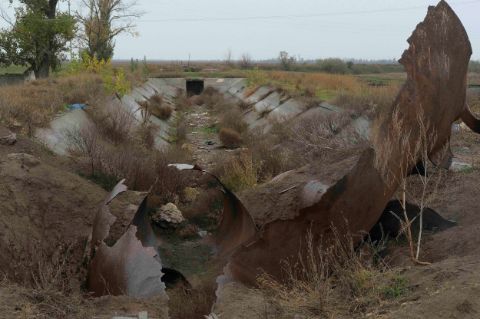
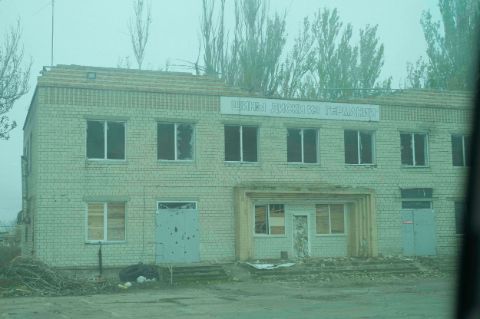
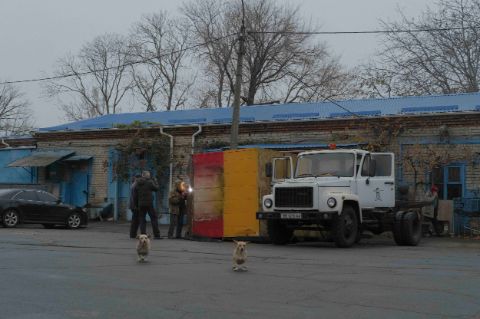
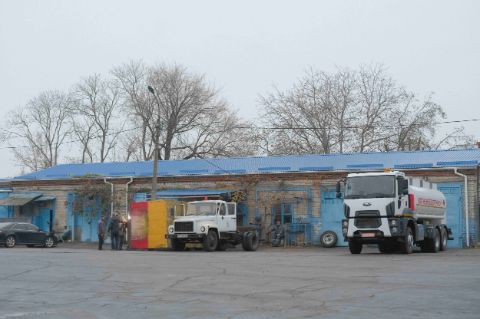
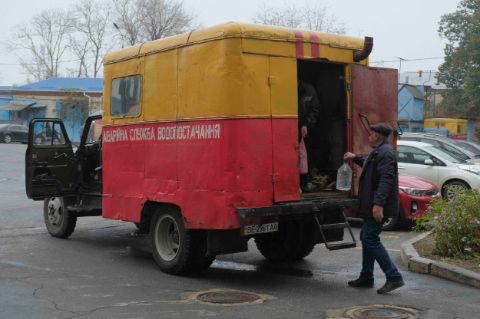
Photos: Yevgenia Belorusets, from the war diary Oblast Mykolajiw, 2023
